 W
WPublic consultation, public comment (US), or simply consultation, is a regulatory process by which the public's input on matters affecting them is sought. Its main goals are in improving the efficiency, transparency and public involvement in large-scale projects or laws and policies. It usually involves notification, consultation as well as participation. A frequently used tool for understanding different levels of community participation in consultation is known as Arnstein's ladder, although some academics contest that Arnstein's ladder is contextually specific and was not intended to be a universal tool. Ineffective consultations are considered to be cosmetic consultations that were done due to obligation or show and not true participatory decision making.
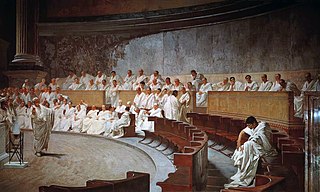 W
WPublic speaking is giving speech face to face to live audience. However, due to the evolution of public speaking, it is modernly viewed as any form of speaking between an audience and the speaker. Traditionally, public speaking was considered to be a part of the art of persuasion. The act can accomplish particular purposes including to inform, to persuade, and to entertain. Additionally, differing methods, structures, and rules can be utilized according to the speaking situation.
 W
WGreg Autry is an American space policy expert, educator, entrepreneur and author. He serves as Chair of the Safety Working Group on the COMSTAC. He was an Assistant Professor of Clinical Entrepreneurship in Marshall School of Business at the University of Southern California. Prior to that, he served as an adjunct professor of strategy and entrepreneurship at the Merage School of Business at the University of California, Irvine. Autry served on the NASA Agency Review Team for the incoming Trump administration in 2016 and temporarily as the White House Liaison at NASA in 2017. He holds an MBA and PhD from the University of California, Irvine.
 W
WA diatribe, also known less formally as rant, is a lengthy oration, though often reduced to writing, made in criticism of someone or something, often employing humor, sarcasm, and appeals to emotion.
 W
WEloquence is fluent, forcible, elegant or persuasive speaking. It is primarily the power of expressing strong emotions in striking and appropriate language, thereby producing conviction or persuasion. The term is also used for writing in a fluent style.
 W
WA eulogy is a speech or writing in praise of a person or persons or things, especially one who recently died or retired or as a term of endearment.
 W
WA human microphone, also known as the people's microphone, is a means for delivering a speech to a large group of people, wherein persons gathered around the speaker repeat what the speaker says, thus "amplifying" the voice of the speaker without the need for amplification equipment.
 W
WHyde Park is a heritage-listed 16.2-hectare (40-acre) urban park located in the central business district of Sydney, in the City of Sydney local government area of New South Wales, Australia. It is the oldest public parkland in Australia. Hyde Park is on the eastern fringe of the Sydney city centre and is approximately rectangular in shape, being squared at the southern end and rounded at the northern end. It is bordered on the west by Elizabeth Street, on the east by College Street, on the north by St. James Road and Prince Albert Road and on the south by Liverpool Street.
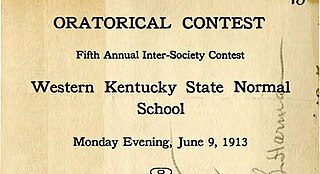 W
WThe Interstate Oratory Association is an intercollegiate contest in oratory or persuasive speaking. Founded in 1874, the IOA is the oldest public speaking organization in the United States and has held contests for the top oratory or persuasive speakers from each state ever since. The annual Interstate Oratory Contest is usually held within the last weekend of April with two representatives from state competing at the event. The most recent IOA contest was held at West Chester University on April 26–28, 2019.
 W
WGeoffrey Notkin is an American actor, author, and entrepreneur. Notkin is known as one of the hosts of Meteorite Men, a documentary reality television series from Science Channel, which ran for three seasons. He is the president of the National Space Society, and holds a seat on the National Space Society Board of Governors. He is a long-time member of The Explorer's Club. In 2013, Notkin's Twitter account was nominated for a Shorty Award, honoring the best in social media. Notkin has also been interviewed on the Today show, Coast to Coast, and NASA Edge TV, and is a regular guest speaker at TusCon, an intimate science fiction, fantasy, and horror convention held annually in Tucson, Arizona.
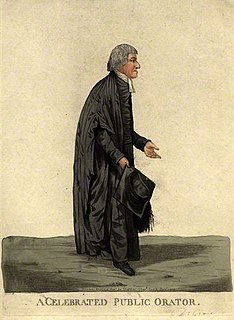 W
WThe Public Orator is a traditional official post at universities, especially in the United Kingdom. The person in this position acts as the voice of the university during public occasions.
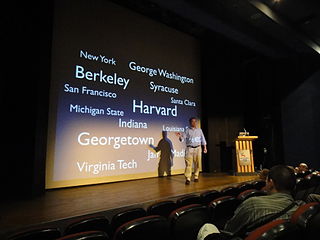 W
WA presentation is the process of communicating a topic to an audience. It is typically a demonstration, introduction, lecture, or speech meant to inform, persuade, inspire, motivate, or to build good will or to present a new idea or product. The term can also be used for a formal or ritualized introduction or offering, as with the presentation of a debutante. Presentations in certain formats are also known as keynote address.
 W
WA public lecture is one means employed for educating the public in the arts and sciences. The Royal Institution has a long history of public lectures and demonstrations given by prominent experts in the field. In the 19th century, the popularity of the public lectures given by Sir Humphry Davy at the Royal Institution was so great that the volume of carriage traffic in Albemarle Street caused it to become the first one-way street in London. The Royal Institution's Christmas Lectures for young people are nowadays also shown on television. Alexander von Humboldt delivered a series of public lectures at the University of Berlin in the winter of 1827–1828, that formed the basis for his later work Kosmos.
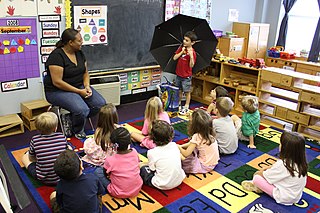 W
WShow and tell is the practice of showing something to an audience and describing it to them, usually a toy or other children's-oriented item. In the United Kingdom, North America, New Zealand and Australia, it is a common classroom activity in early elementary school. In a typical session of show and tell, a child will bring an item from home and will explain to the class why they chose that particular item, where they got it, and other relevant information.
 W
WA soapbox is a raised platform which one stands on to make an impromptu speech, often about a political subject. The term originates from the days when speakers would elevate themselves by standing on a wooden crate originally used for shipment of soap or other dry goods from a manufacturer to a retail store.
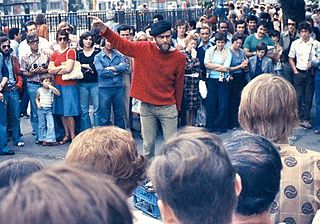 W
WA Speakers' Corner is an area where open-air public speaking, debate, and discussion are allowed. The original and best known is in the northeast corner of Hyde Park in London, England. Historically there were a number of other areas designated as Speakers' Corners in other parks in London, such as Lincoln's Inn Fields, Finsbury Park, Clapham Common, Kennington Park, and Victoria Park. Areas for Speakers' Corners have been established in other countries and elsewhere in the UK.
 W
WA political stump speech is a standard speech used by a politician running for office. Typically a candidate who schedules many appearances prepares a short standardized stump speech that is repeated verbatim to each audience, before opening to questions.